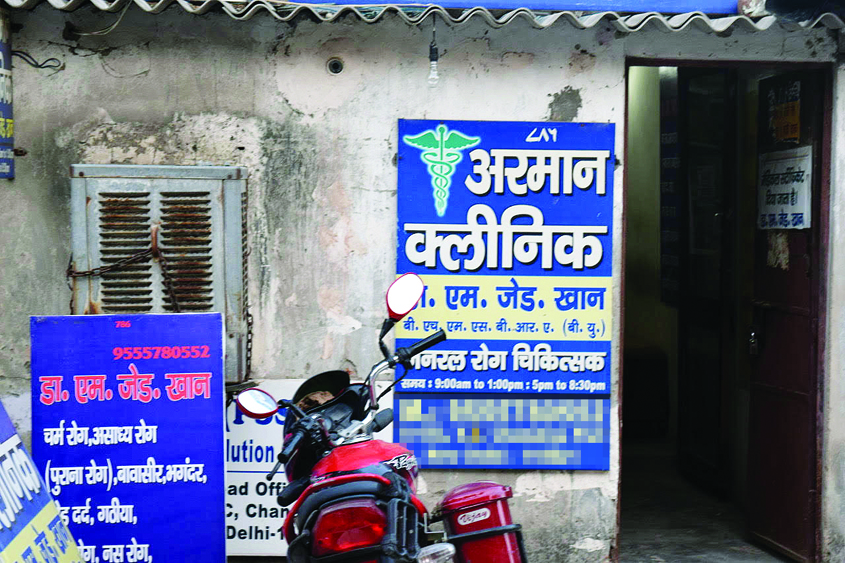Unqualified medical practitioners continue to operate in the national capital with impunity, as the local administration turns a deaf ear to a 2013 Delhi High Court directive, tasking the Health Department of Delhi to check quackery.
An investigation by The Sunday Guardian in the national capital’s less affluent areas such as Sangam Vihar and Chanakyapuri’s Sanjay Camp-1, found that quacks are openly practising medicine in make-shift clinics. Most researchers and doctors this reporter spoke to, attributed the free run of quacks to “police inaction” and “lack of political will”, with some claiming that 70% of doctors in the city are quacks. The patients who visit these quacks in large numbers consider these people as their first option because of the low consultation fees that the latter charge. They generally charge less than Rs 100 as consultation fee, which often includes medicines for two days. The extent of police inaction can be understood from the fact that most of these quacks are practising medicine in broad daylight.
In Sanjay Camp-1, a quack was seen using drugs (marijuana) inside his makeshift-clinic and in Sangam Vihar, another quack runs his “clinic” with the help of both the locals and the police.
“They have support from the locals and the police. The locals consider them as saviours, while the police protects them in exchange of monthly bribes,” a resident of Sangam Vihar told this correspondent. Experts outlined the gravity of the situation, saying the patients seeking treatment from these impostors risk being “mistreated” severely.
“The implications are numerous and could range from antibiotic resistance, infection from unhygienic practices like the use of sterile syringes, needles, disposal of medical waste, non-recognition of serious symptoms like diabetes, heart related conditions, even tuberculosis and HIV/AIDS. This can sidetrack or delay treatment,” said Shailaja Chandra, former Secretary to the Ministry of Health and Family Welfare and senior fellow at the Shiv Nadar University.
Shailaja Chandra’s recent study on unqualified medical practitioners in India says that despite the huge number of unqualified medical practitioners across the city, only 875 closure orders have been issued by the Medical Council of India (MCI) in 10 years.
“MCI says it is for the state Medical Councils to take action. The latter say they do not have the staff to pursue cases in court and co-ordination is required with the police, the Drug Controller and health departments and this is not a priority for anyone,” Shailaja Chandra noted.
In its defence, Delhi Medical Council (DMC) stressed upon the lack of co-ordination between various departments as the reason behind inefficient containing of the menace.“We send the list of identified quacks, but the health department is infrequent in conducting raids. Even after the raids, it is a struggle to get the case registered with the police. And then our slow judicial proceedings further delay action. It’s a viscous circle,” claimed Bansal.
In 2013, the Delhi High Court had directed the health department of the Delhi government to contain widespread quackery. The court also came down heavily on cross-pathy—the practice of prescribing homoeopathy and ayurvedic medicines along with allopathy—by unani, ayurveda and homeopathy practitioners. Subsequently, a committee comprising the Additional Solicitor General of India, medical councils and associations, drug controller, and the Delhi police submitted its recommendations to the court on 29 May 2014.
According to the recommendations, Chief District Medical Officers (CDMO) will conduct raids regularly in all the 13 districts of the national capital and SHOs will keep a tight check on unauthorised medical practitioners. However, three years later, the situation is far from addressed and doctors and medical councils have accused the police and the Delhi government of being reluctant to take action against these quacks. “Around 70% of the doctors in Delhi are quacks. Neither the Congress had nor does the Aam Admi Party have the will to address the issue. Banning them would put them under pressure to fill the gap of these 60,000-70,000 quacks. So they choose to turn a blind eye,” claimed Dr Anil Bansal, who is a former chairman of the Anti Quackery Cell of the Delhi Medical Council. Besides negligence, the Delhi Police and the health department of the Delhi government face charges of corruption while dealing with unqualified medical practitioners masquerading as doctors. Under the condition of anonymity a quack in South Delhi told this newspaper that apart from the police, even CDMOs take fixed monthly cuts from the quacks to conceal their identity. “An officer from the CDMO office comes every month to take the cut. There are several cuts at multiple levels. We give it to avoid being jailed,” the quack said. Healthcare experts and the medical fraternity are at loggerheads on dealing with quacks. Experts argue that a proper medical training given to unlicensed medical practitioners may help address the dismal doctor-to-patient ratio.
However, doctors say that inadequate infrastructure breeds quacks and not the lack of medical practitioners. “Doctors are reluctant to go to slums or villages because they do not get proper clinics, dispensaries, equipment and electricity,” said Dr Mahendra Jindal, who was present at a recent anti-quackery protest organised by the Indian Medical Association at Rajghat in Delhi.

